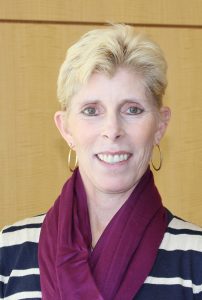In 2011, Tricia Prestia was wearing a lot of hats. A wife, a mother and a busy women’s health nurse practitioner in Cary, Tricia drew on her training and experience as a cytologist – the person who studies cellular changes that may indicate cancer – in her nursing practice.

But then, Tricia was forced to wear a new hat when she was diagnosed with a rare form of leukemia called acute promyelocytic leukemia, a subtype of acute myeloid leukemia. She explains, “Even though you have all this medical knowledge, this is the moment when you become the patient who has questions, fears, doubts and concerns. I was the health care provider, the wife and the mother and now the patient. And at that instant, instead of taking care of and explaining things to your patients, you have to absorb what’s happening to you, translate the medical terms for your family, and take care of yourself. It was a challenging time on many levels.”
Tricia was a serious athlete, involved in tennis and golf, but she had to stop tennis because of fatigue. Then, bruises and a fever caused her to visit her doctor who sent her to the Emergency Department after her blood counts showed that she had leukemia. She was brought to UNC by ambulance in serious condition. “They told Charlie, my husband, that he might want to say goodbye to me since they didn’t know if I would make it through the night. Charlie called our son in Washington, DC.”
Tricia came to UNC because Dr. Matt Foster was a principal investigator for a clinical trial to treat APL. “I started the study, but was taken off because the cancer had spread to my spine. Metastasis to the spine was not what anyone expected, so they modified the study for me. After multidrug chemotherapy in the hospital, I had daily chemotherapy for the leukemia from December until February 2012. I had weekly chemo for the spinal metastasis along with the daily from February until May 2012. Then 2 x 1 week stays in house with multi drug chemo twice a day and a dose of spinal chemo each week. I was finally done by the beginning of August 2012”
But her medical challenges were not over yet. October 2012 she was diagnosed with a rare, life-threatening fungal infection she contracted from being in her backyard during the time she was immune-compromised. “UNC surgeons Dr. Deb Bhowmick, who removed portions of my spine which was destroyed by the fungus and then needed to place a Pedicle Screw Fixator to the weakened spine, and Dr. Benjamin Haithcock who had to remove the lower right lobe of my lung invaded by the same fungus. I finished my last dose of medication for the Mucormycoses in August 2013. They weren’t sure I’d survive this either, but I did.”
Tricia is now in remission.
In 2013 Tricia joined the Patient and Family Advisory Board for the N.C. Cancer Hospital and is serving as a rounder and a member of the Emergency Room Committee. Rounding involves visiting with patients in waiting areas and the infusion clinic to listen to their concerns and get feedback on the cancer hospital’s services. Her UNC training in nursing and as a nurse practitioner as well as her time spent at Memorial Sloan-Kettering Cancer Center as a cytologist informs her work with the Board.
She says, “Rounding is a wonderful way to really work with patients and to make sure they know that this hospital is here for them. The Emergency Room Committee is already working on a number of ways to improve the patient and family experience. I used to work in an emergency room as a nurse, so to see this group being proactive is great.”
Tricia’s outlook remains upbeat despite the enormous health challenges she has faced. “My motto is ‘the sun is out even when it’s raining.’ There are two paths people can choose if they have cancer or a life-altering event. One path brings you to despair and to ask why me. Those vibes don’t help your body, your mind or your strength in any way. That negativity does not allow your body to heal. The other path, the path of light, sustains you even on a day when you might be feeling a little bit blue. Your friends, your family, the trees, your dog, the birds, the rain, it doesn’t matter; you’re taking a breath, a breath that you would not normally have had. That will get you through the day. That’s what makes the fact that even when it’s raining the sun is out. It’s those things that people forget in their daily life. Just in an instant, take a look around you and take a deep breath.”
She has used her cancer experience to help others. Employees at Charlie’s company, Lenovo, have become UNC platelet donors. Charlie and Tricia established a charitable foundation called Lickin’ Leukemia that raises funds through tennis and golf events at Cary’s Prestonwood Country Club to help patients and families affected by leukemia. “The fundraising events were established in honor of my friend, and me, since we were diagnosed with leukemia six months apart and were both treated at UNC.”
She vows, “If even for a moment there’s anything I can do, to help somebody else, I just want to do that.” This new member of the Patient and Family Advisory Board is doing just that.
